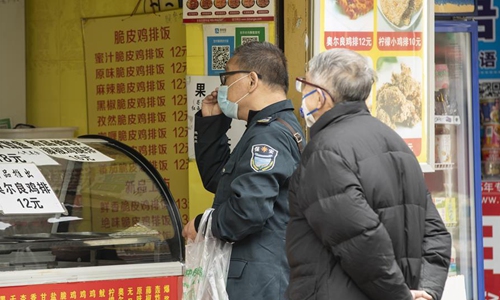HOME >> OPINION
Challenge only beginning as storms lie ahead: Global Times editorial
Source:Global Times Published: 2020/4/6 22:48:40

People buy food in Wuhan, capital of central China's Hubei Province on Wednesday. Life in Wuhan is gradually back to normal as the coronavirus outbreak wanes. Photo: Xinhua
The crisis triggered by COVID-19 outbreak has only just begun: The pandemic and the international political situation bode further and more severe challenges. As a major country that was also among the first to bring the novel coronavirus under control, China must prepare to face an extremely complicated situation.The pandemic seems unlikely to end quickly. The epicenter has been shifting as coronavirus has spread across the globe.
In addition, certain animals that are in close contacts with human beings are becoming new hosts for the virus. In all probability, the coronavirus will repeatedly strike at society. It may only be brought under control rather than eradicated.
The numbers and rates of infections and deaths in China are smaller than those in the US and Europe. However, assuming the pandemic continues for a lengthy period, those societies currently suffering high infection rates and death tolls may develop corresponding adaptability. At that time, the battle against COVID-19 will also change. China must therefore accelerate R&D of vaccines and therapeutic medicines so as to help all humanity win the next stage of the race against the coronavirus.
After China had brought the virus under control, the country's primary task appeared to be economic recovery. But as the shadow of the pandemic spreads across Europe and the US, a global economic recession has become a foregone conclusion. Unprecedented turmoil beckons in the world's economic structure. Timing the resumption of work in China is now connected with both public health and international politics.
China has two major goals in resuming work. First, it is to maintain normal life by ensuring the basic functioning of the country's economy, reducing the number of bankruptcies and guaranteeing employment as much as possible.
Second, China must ensure economic recovery in order to maintain the country's status as the center of the world's manufacturing industry. These goals define China's current strategic work.
The COVID-19 pandemic will impact the world order and trigger turmoil. Nationalists and populists may have more room to fan the flames and China is likely to become the target of certain Western leaders to displace their peoples' anger and disappointment. Impulsivity and irrationality may replace due reflection in the West, and thus China may face much more serious risks in the arena of international politics.
Comprehensive preparations must be made right now, especially in terms of strategic power that can force challengers to stay calm. China doesn't have much time for this.
Domestically, China's most important work is to increase solidarity and coherence throughout society, which will need to withstand unprecedented pressures. Dissatisfaction manifested during this crisis must be attended to, while relevant problems must be solved to remedy hidden scars left since the outbreak of COVID-19.
It should be noted that the unexpected changes in the global spread of the virus have continually updated the Chinese people's understanding of the crisis and their evaluation of China's epidemic prevention efforts. China is in a very advantageous position to solve problems by seeking truth from facts, and to build consensus and confidence throughout Chinese society.
There are great uncertainties ahead, but China has brought the coronavirus under control and proven the strength of its capacity for national mobilization. The country also possesses the world's most comprehensive national industrial base. China is completely able to overcome any challenge it meets, safeguard its strategic security, and protect its people's interests.
Posted in: EDITORIAL